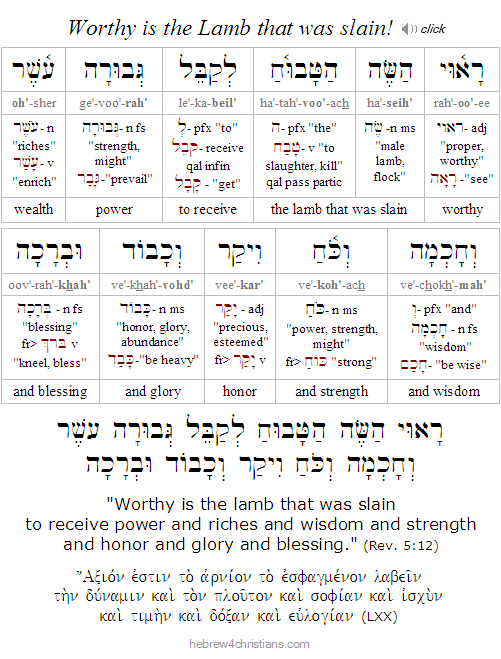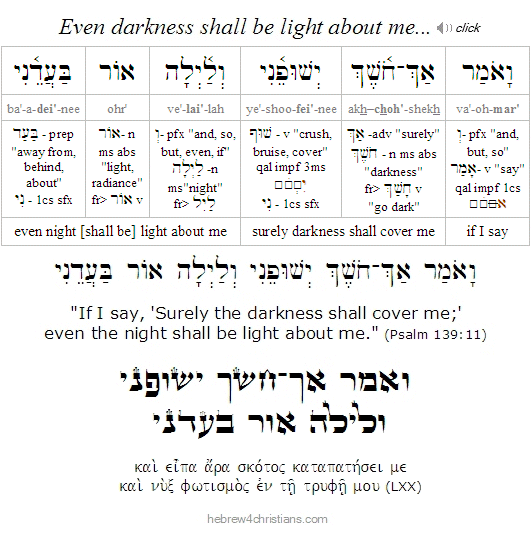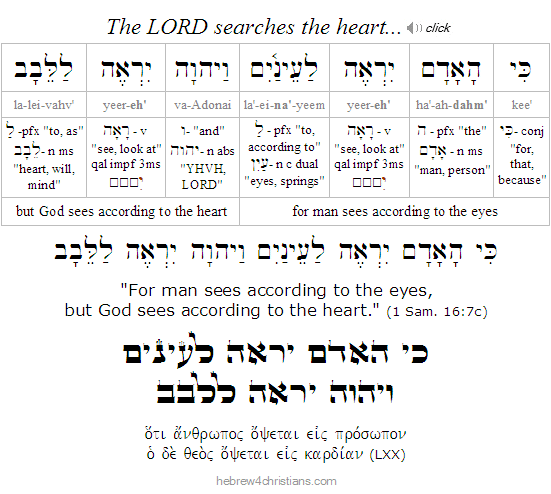|
March 2022 Updates (continued)
Note: If any page content appears to be missing, please refresh the page...
Foundation Stone of Reality...
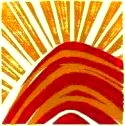
03.04.22 (II Adar 1, 5782) As followers of Yeshua, we no longer find our identity in this world but rather through our spiritual union with the ascended LORD (Gal. 2:20; 6:14; Eph. 1:3; 2:6)... Therefore we are instructed to "seek the things that are above (τὰ ἄνω ζητεῖτε) where the Messiah is seated at the right hand of God," and focus our thoughts on the things above - not on things here on earth - for we have died, and our lives have been hidden (κέκρυπται) with Messiah in God. When the Messiah, who is our life, appears, we too will appear with him in glory" (Col. 3:1-4). It is a spiritual decision to "seek first the kingdom of God" (Matt. 6:33), which means that we must attach ourselves to God, esteeming the unseen and the eternal as more real than the seen and the temporal (2 Cor. 4:18).
Turn away therefore from worldly news and gossip; these affairs are empty, vain, and devoid of ultimate significance; instead redirect your thoughts toward heaven. Understand that you belong to God and that your true home is in the world to come. Affirm this truth over and over until it becomes a part of your daily soul... Put away from you the "old nature" – all those labels and judgments that used to define you - and open your heart to the radiance and peace of God instead (Col. 3:15). As it is written: "You will keep in perfect peace (i.e., שלום שלום, "the peace of peace") the one who leans on you, because he trusts in you. Trust in the LORD forever and ever, for in Yah the LORD (יה יהוה) is the Rock of Ages" (Isa. 26:3-4)
Hebrew Lesson
Isaiah 26:2-4 Hebrew reading:
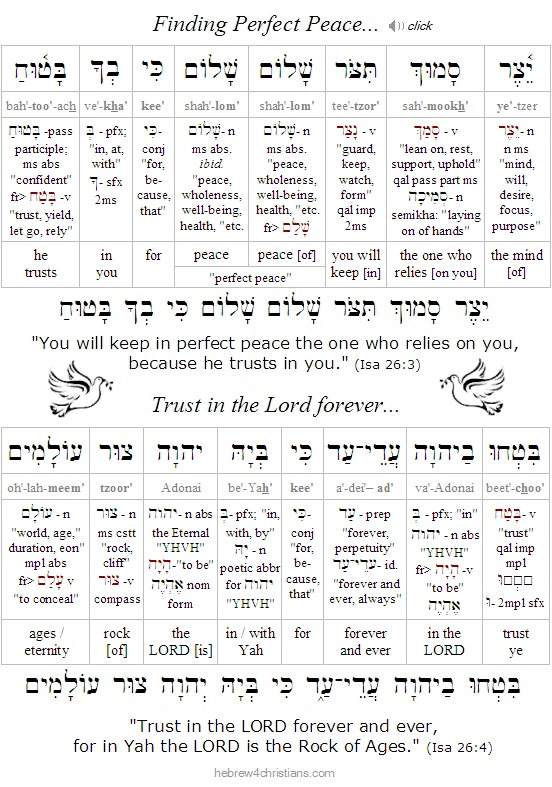 |
Note: The word "shalom" from a root (שׁלם) meaning whole or complete. Shalom does not merely mean the absence of strife as much as healing, wholeness, and well-being despite the presence of strife. For example, after he wrestled with the Angel of the LORD, the Scripture says "Jacob came whole" (וַיָּבֹא יַעֲקֹב שָׁלֵם), connecting his painful struggle to receive the blessing with his healing (Gen. 33:18). Shabbat shalom, chaverim!
Loving one another...
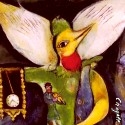
03.04.22 (II Adar 1, 5782) Mark Twain once said: "Let us consider that we are all partially insane. It will explain us to each other; it will unriddle many riddles; it will make clear and simple many things which are involved in haunting and harassing difficulties and obscurities now." Amen, we are all frail people in need of forgiveness, encouragement, and acceptance. Therefore may we all be patient and forgiving toward one another, since we are all children of Adam who struggle with sin, despair, and loneliness, and we all suffer from cognitive dysfunction... We all need healing, we all need help, and we all desperately need God.
Each of us, such as we are, is on the "road of life," and each passing day draws us closer to our end. Therefore we should treasure our time, the remains of our day. "Any time you are with anyone or think of anyone you must say to yourself: I am dying and this person too is dying, attempting the while to experience the truth of the words you are saying. If every one of you agrees to practice this, bitterness will die out, harmony will arise" (de Mello).
Time is short. We are must love others, and that includes "the stranger." "Be merciful, even as your Father is merciful; be kind to one another, tenderhearted, forgiving one another, as God in Yeshua forgave you. Therefore be imitators of God, as beloved children."
Hebrew Lesson
Lev. 19:18b Hebrew reading:
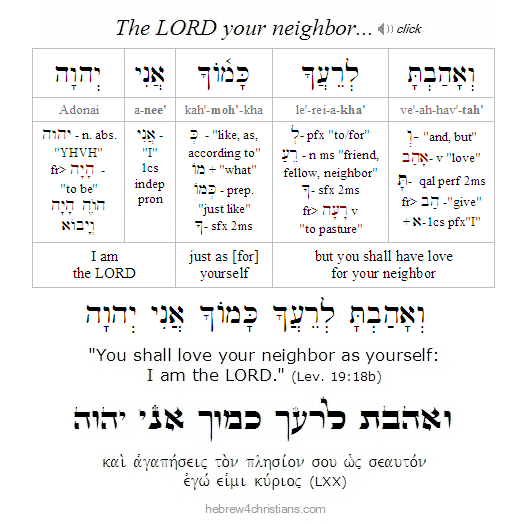 |
Trusting God's love for you...

[ "When you think of what you are, and despair; think also of what He is, and take heart." - Charles Spurgeon ]
03.04.22 (II Adar 1, 5782) "Father forgive them, for they know not what they do" (Luke 23:34). Yeshua's intercession is not just for the sins we have consciously committed but to the sins done in the blindness of our unconscious; his sacrifice was offered not just for our known acts of sin, but for the wayward condition of our darkened hearts... This is essential. When God forgives our sin, it goes beyond forgiveness of the sinful behavior to the innate sickness of the heart. Divine forgiveness is remedy for our alienation, our lostness. It is healing of our deepest self, our secret heart, wherein we become a new creation. If God accepts us at all, he accepts us completely, and that means we are made righteous by means of his love and grace.
Teshuvah ("repentance") is not about becoming better but about becoming different. It is about newness of life. As Yeshua said, "Unless you are born again, you cannot see the kingdom of heaven." Believe that you have received it and it will be yours (Mark 11:24).
Hebrew Lesson
Psalm 63:3 Hebrew reading:
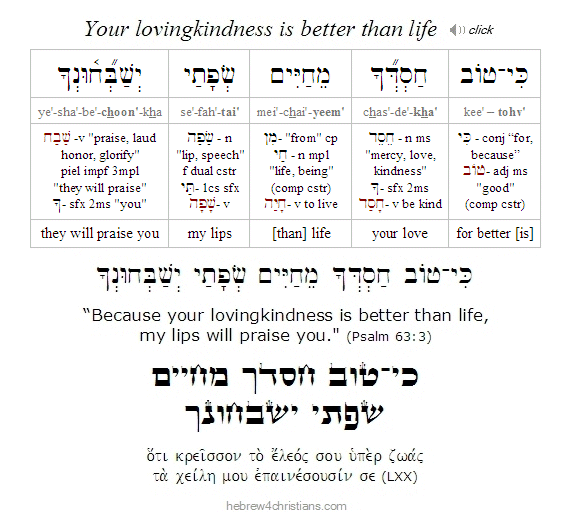 |
If there's hope for eternal life, it is found in the one who "loved me and gave himself for me" (Gal. 2:20). I put no trust in religion, nor in the reformation of my character, nor in my will to believe, but solely in the kindness of the one who heals me from the ruin of my self.
Our Strong Tower (מגדל־עז)
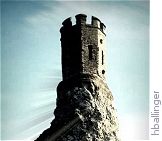
03.04.22 (II Adar 1, 5782) Chodesh tov, chaverim. There is one name for God that occurs far more than all the others combined in our Scriptures, and that is the personal Name of the Lord God of Israel: YHVH (יהוה). Now the Name YHVH implies that God is the Faithful One (האל הנאמן), since it is formed by permutating the letters of the Hebrew root "to be": hayah (היה), hoveh (is), and yihey (will be) to indicate that God is always Present in every place, and that there is no power that prevent him from fulfilling His promises at any time.... YHVH is Lord of lords and King of kings whose word can never fail (Deut. 10:17; Dan. 2:47). Ein od milvado (אֵין עוֹד מִלְבַדּו): "there is no power apart from Him" (Deut. 4:35,9).
"The Name of the LORD is a strong tower; the righteous one runs into it and is made safe" (Prov. 18:10). In this verse, the name YHVH is likened to a migdal oz - the "strong tower" that was used as the chief fortification for a city in ancient times. For the tzaddik -- the righteous person who calls upon the Name of the LORD -- God is an all-powerful defense in times of peril. The metaphor suggests a righteous man running into an immensely fortified tower, being elevated high above the surrounding danger. The LORD is a strong tower of refuge for those who put their trust in Him.
The Hebrew name Yehoshua (יהושׁוע), or "Joshua," derives from a combination of YHVH and the verb yasha (ישׁע), to save," meaning "YHVH saves." Later Yehoshua was shortened to Yeshua (i.e., ישׁוע; see Nehemiah 8:17), which is the Hebrew name for "Jesus," of course. As a "type" of Joshua, Jesus exemplifies the ultimate deliverance of His people by taking Israel into the land to inherit the promises. Indeed, calling upon the Name of the Yeshua is to call upon the Name of YHVH, since Yeshua himself is YHVH come in the flesh (see Isa 9:6; Isa 45:23; Phil 2:11; Rom 10:9, among other verses). There is no other name given to mankind for salvation (Acts 4:12, Isa 43:11).
Dear friends, let us enter into Goshen (גשׁן) by "drawing near" in trust... May the LORD God our Savior be our Strong Tower of refuge for us during this time of worldwide uproar and fear. צדקתו מצילה ממוות - his righteousness saves from death. Amen.
Hebrew Lesson
Proverbs 18:10 reading:
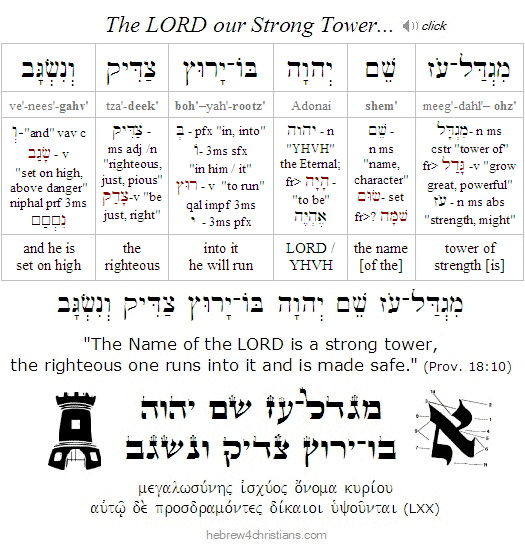 |
The Ocean of Torah...

[ We all know so little; thank God he gives us grace to know matters of His heart... ]
03.03.22 (I Adar 30, 5782) A young man once sought audience with a well-respected rebbe to ask if he could become his student. The rebbe asked the chasid, "Do you know any Torah?" The young man softly answered, "Only a little..." Replied the rebbe, "That is all we ever know, a little Torah...."
The Scriptures do not command us to believe "on cue," but rather reveal a world of questions for our hearts to ponder. Instead of regarding the Bible as a "Book of Answers" for our questions, it is worthwhile to think of it as a "Book of Questions" for our answers. As we listen, God questions us so that we can know him by means of the dialog within our hearts. As any good teacher knows, when a student earnestly wrestles with a question he learns more than if he were given a straightforward answer. Similarly, God gives us permission to be without answers so that we will be free to seek, to struggle, and to "own" what we come to understand through our relationship with him; that way our learning will be real, substantive, and born from the urgency our own inner need.
Augustine of Hippo (354-430) tells of a vision of seeing a little boy at a beach scooping up the ocean thimbleful by thimbleful and emptying it out on the sand. Then he sees an angel who tells him that this boy will have emptied out the entire ocean long before he could exhaust what may be said about God. The Jewish sages sometimes describe Torah as an "ocean" because it is so profound in layers of meaning and truth. Torah is also likened to a venture into the unknown, into the dark "Cloud of Unknowing," because God is ultimately incomprehensible, and it is impossible to be truly competent in our understanding of him (see Isa. 55:8-9; Isa. 40:13; Rom. 11:33-34, Psalm 147:5).
The progression often goes something like this: First you come to believe and are filled with much conviction; you think you know who God is and what people must do to be saved. As you grow more, however, you encounter further aspects of Torah and become less sure of your own understanding. You begin to realize that you don't have all the answers, and this awareness helps you be more humble and sympathetic regarding the struggles others may have regarding the questions of faith. Paradoxically, the deeper you go in your studies the more you are emptied, though the blessing comes when you find yourself able to empathize with those searching for truth (Psalm 27:8).
Hebrew Lesson
Psalm 147:5 Hebrew reading:
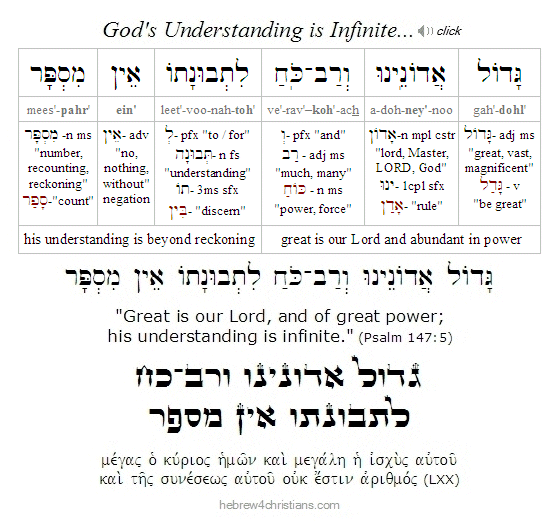 |
Choosing to Belong...
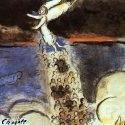
[ This week we finish reading of the great Book of Exodus for this year, so I thought it would be worthwhile to briefly review its overall significance... . ]
03.03.22 (I Adar 30, 5782) The general theme of the Book of Exodus essentially turns on two great events, namely, the deliverance of the Israelites from their bondage in Egypt (yetzi'at Mitzraim) and the subsequent revelation given at Sinai (mattan Torah). Both of these events, however, are grounded in the deeper theme of God's faithful love combined with the need for blood atonement. With regard to the former, the blood of lamb (foreshadowed in Eden) was required to cause death to "pass over" the houses of the Israelites; with regard to the latter, the sacrificial system (i.e., the Mishkan) was required to draw near to God.
Jewish tradition tends to regard the giving of the law at Sinai to be the goal of the entire redemptive process, a sort of "return from Exile" to the full stature of God's chosen people. Some of the sages have taken this a step further by saying that God created the very universe so that Israel would accept the law. Such traditions, it should be understood, derive more from Jewish rabbinical thinking devised after the destruction of the Second Temple than from the narrative presented in the written Torah itself, since is clear that the climax of the revelation at Sinai was to impart the pattern of the Mishkan (altar) to Moses. In other words, the goal of revelation was not primarily to impart a set of moral or social laws, but rather to accommodate the Divine Presence in the midst of the people. This is not to suggest that the various laws and decrees given to Israel were unimportant, of course, since they reflected the holy character and moral will of God. Nonetheless, it is without question that the Torah was revealed concurrently with the revelation of the Sanctuary itself, and the two cannot be separated apart from "special pleading" and the suppression of the revelation given in the Torah itself... The meticulous account of the Mishkan is given twice in the Torah to emphasize its importance to God. This further explains why Leviticus is the central book of the Torah of Moses. (For more on this, see "The Eight Aliyot of Moses.")
As we consider these things, however, it is important to realize that underlying the events surrounding deliverance and revelation is something even more fundamental, namely, the great theme of faith (אֱמוּנָה). This theme is our response to God's redemptive love. God's love is the question, and our response - our teshuvah - is the answer. The great command is always to "Choose life!" We must chose to turn away from the darkness to behold the Light... Jewish tradition states there were many Jews who perished in Egypt during the Plague of Darkness because they refused to believe in God's love. Likewise, the revelation at Sinai failed to transform the hearts of many Jews because they despaired of finding hope.
As glorious as the redemption and revelation was, then, there was something even more foundational that gave "inward life" to God's gracious intervention. You must first believe that God loves you and regards you as worthy of His love; you must "accept that you are accepted." It is your faith that brings you near... This is the "Cinderella Story" of Exodus.
The themes of the Book of Exodus, and indeed of the Bible itself, will mean little to you unless you identify with the journey of the people, and that implies that you reckon yourself as worth saving... You must see yourself as the recipient of divine affection and love. After all, without this as a first step, how will you make the rest of the journey? This is similar to the very First Commandment revealed at Sinai: "I AM the LORD your God, who brought you out of the land of Egypt..." Notice that the statement, "I AM the LORD your God" (אנכי יהוה אלהיך) was uttered in the second person singular, rather than in the plural. In other words, you (personally) must be willing to accept the love of the LORD into your heart, since the rest of the Torah is merely commentary to this step of faith. Therefore the Book of Exodus is called Shemot (שְׁמוֹת), "names," because it sees every person as worthy of God's redeeming love and revelation. "For God so loved the world..." (John 3:16).
The midrash says that only one out of five of the children of Israel left Egypt; some say one out of fifty, and some say one out of five hundred (Mechilta). As Yeshua said: "Many are called, but few are chosen" (Matt. 22:14). Those who directly experienced God's deliverance in Egypt first of all believed they were redeemable people. Before anything else they made a decision to receive hope within their hearts. The blood of the original Passover was a smeared as sign of their faith that God would accept them. We also must begin here. This is the start of the journey. We step out by faith, leaving behind the familiar - including the dark familiarity of our sin and shame - and venture out into the unknown. We venture out in hope, because we trust in the love and promises of God.
The journey of faith is marked with testing, of course. Being called out of the world leads you into the desert places. Faith is not something static, like a church creed or theology handbook. There are stony places, dangers, and difficulties that attend the way. We move out from "walled cities" into tents, traveling as "strangers and sojourners" on our way to a promised heavenly city. Therefore the Scriptures state that "by faith Abraham went to live in the land of promise, as in a foreign land, living in tents with Isaac and Jacob, heirs with him of the same promise. For he was looking forward to the city that has foundations, whose designer and builder is God" (Heb. 11:9-10). The way back home is the same for all who "cross over" from this world to the next. It is the way of hope, trust, and surrender.
The story of divine deliverance is not the story of "other people"; it is not a story told in the "third person." You must choose to belong. Again, your faith draws you near. That is why the sages teach: b'chol dor vador - in each and every generation an individual should look upon him or herself as if he or she (personally) had left Egypt. It's not enough to recall, in some abstract sense, the deliverance of the Jewish people in ancient Egypt, but each Jew is responsible to personally view Passover as a time to commemorate their own personal deliverance from the bondage of Pharaoh. The same must be said regarding Shavuot. Each person should consider himself as having personally received revelation at Sinai. The altar of the Mishkan was set up for you to draw near to God - you, not some people who lived long ago... This is why non-Jews who turn to the God of Israel by putting their trust in the Messiah are regarded equal members in the covenants and promises given to ethnic Israel. It is a brit milah (בְּרִית מִילָה) - literally, a "covenant of the word" - that makes us partakers of the covenantal blessings given to Abraham (Eph. 2:12-19; Gal. 3:7; Col. 2:11, etc.).
The narratives of the Book of Exodus, like other narratives of the Torah, often function as parables for us. "The deeds of the fathers are signs for the children." Signs of what? Of the coming Messiah, as Yeshua Himself attested and the apostles likewise affirmed (John 5:46; Luke 24:27;44; Matt. 13:52; 2 Tim. 3:14-17). The Mishkan (i.e., "Tabernacle") itself was a metaphor of God's redemption given in Yeshua. The Mercy Seat (kapporet) represented the Throne of God (Heb. 4:16; 2 Ki. 19:15) where propitiation for our sins was made (Rom. 3:25). Indeed, the word Mishkan (מִשְׁכָּן) is related to the word mishken (מִשְׁכֵּן), "collateral on a loan." The Tabernacle functioned as a "loan" to Israel until the Messiah came to establish the true Temple by means of His atoning sacrifice (Gal. 3:19). The law is called a "schoolmaster" meant to lead to the Messiah and His Kingdom rule (Gal. 3:23-26). The glory of the Torah of Moses was destined to fade away (2 Cor. 3:3-11), just as its ritual center (i.e., the Tabernacle/Temple) was a shadow (σκιά) to be replaced by the greater priesthood of Malki-Tzedek (Heb. 10:1; 13:10). "Now we are released from the law, having died to that which held us captive, so that we serve in the new way of the Spirit and not in the old way of the written code (Rom. 7:6). Yeshua is the Goal and the "Goel" (i.e., גּאֵל, Redeemer) from the curse of the law... "For the law made nothing perfect, but on the other hand, a better hope is introduced, and that is how we draw near to God" (Heb. 7:19). When the veil is taken away, Yeshua appears on every page of Scripture... (For more on this, see "Why then the Law?," and "Paul's Midrash of the Veil").
Outside of the Mishkan, beyond the outer court, are the raw, "natural" experiences of life. This is the realm of the carnal flesh and the "dust to dust, ashes to ashes" despair of olam hazeh. Spiritual life is found when you come in through the gate. You must understand that the gate is there for you to pass through.... The cross of Yeshua is the altar where He died for you, personally, for your atonement with the Father. His blood was presented between the outstretched wings of the cherubim so that you could come before God "panim el panim," that is, personally, "as a man speaks to his friend" (Heb. 4:16). Your faith bridges the gap between the "Holy of Holies" of the Cross and the sanctuary of your heart...
Hebrew Lesson
Isa. 43:1b Hebrew reading:
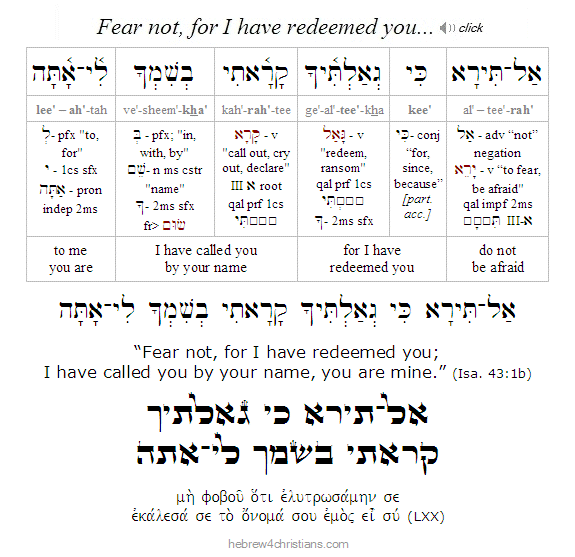 |
Further thoughts on Pekudei:
Accounting for the Lamb...
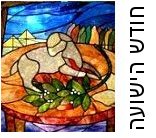
03.03.22 (I Adar 30, 5782) In our Torah portion for this week (i.e., Pekudei) we learn that Moses consecrated the Mishkan (Tabernacle) on Rosh Chodashim, that is, "the first day of the first month of the second year [since the Exodus]" (Exod. 40:17). Note that this date (i.e., Nisan 1) marks the start of the Biblical year and "Chodesh Yeshuah" (חודש הישועה), or the month of the Passover Redemption (Exod. 12:1-12). The Torah's calendar therefore begins with the advent of the Lamb of God (שׂה האלהים), just as the central sacrifice of the Tabernacle was the daily sacrifice (i.e., korban tamid: קרבן תמיד) of a defect-free male lamb offered with unleavened bread and wine. The LORD calls this "My offering, My bread" (see Num. 28:1-8). In other words, the service of the earthly Tabernacle was intended to constantly foreshadow the coming Lamb of God who would be offered within "greater and more perfect Tabernacle (משׁכּן גדוֹל וּמשׁלם) not made with hands" to secure the eternal redemption (פדוּת עוֹלמים) for us (see Heb. 9:11-12).
As I've mentioned over the years, the climax of the Torah given at Sinai was the revelation of the Tabernacle. The two tablets of the law, summarizing the Ten Commandments, were stored inside the Ark of the Covenant (ארון ברית יהוה), the innermost place of the Tabernacle, a sacred "three-in-one" box. As such, the ark served as a symbol of kisei ha-kavod (כסא הכבוד), the very Throne of Glory. It stood entirely apart as the only furnishing placed in the Most Holy Place, or the "Holy of Holies" (קודש הקודשים). Upon the cover of the Ark (i.e., the kapporet: הכפורת) were fashioned two cherubim (i.e., angel-like figures) that faced one another (Exod. 25:17-18). According to the Talmud (Succah 5b), each cherub had the face of a child - one boy and one girl - and their wings spread heavenward as their eyes gazed upon the cover (Exod. 25:20). God's voice would be heard only in the midst of innocence, humility, purity, and hope... Each year during the Yom Kippur (יום הכיפורים) ceremony, the High Priest would sprinkle sacrificial blood seven times upon the cover of the Ark of the Covenant to dramatize cleansing from the law's verdict and the atonement of sin that would be secured through the blessing of the Messiah.
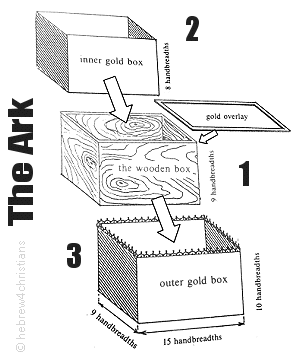 |
"But when the Messiah appeared as the High Priest (הכהן הגדול) of the good things that have come, then through the greater and more perfect tabernacle (not made with hands, that is, not of this creation), he entered once for all into the Most Holy Place (בקדשׁ הקדשׁים), not by means of the blood of goats and calves but by means of His own blood, thus securing for us the eternal redemption" (Heb. 9:11-12). Amen. The Scriptures emphatically teach that there is no Passover without accounting for the blood of the Lamb of God!
Hebrew Lesson
Rev. 5:12 Hebrew reading:
The Time of Visitation...

03.02.22 (I Adar 29, 5782) We must ready our hearts for the time of the Lord's coming, for the hour ever draws near... Yeshua lamented over Israel: "You did not recognize the time of your visitation..." (Luke 19:44). But how was it possible for otherwise devoutly religious people to miss the advent of the Messiah were it not because they disregarded the signals meant to awaken them? "So also, when you see all these things, you know that he is near, at the very gates" (Matt. 24:33). That's part of the meaning of teshuvah as well: Repent and believe the message of life (see Heb. 3:7-4:11). Esau "repented" with tears, but his wasn't true repentance since he did not turn his heart to embrace the truth of God's love... True repentance always leads to healing and life. When the woman from Magdala wept and washed Yeshua's feet with her tears, he said to those present, "I tell you, her sins, which are many, are forgiven -- for she loved much" (Luke 7:44-48). In other words, she was lavish in her love because she deeply regretted that she had missed what was most important, what she desperately needed all along... She realized her sin as blindness to God's love. After all, why would she weep over her sins unless she loved him? And how could she love him unless he first revealed his love to her? (1 John 4:19). Friends, the Kingdom of God is at hand: wake up and be ready for the advent of the King! The sound of the shofar reminds us that the great Day of the LORD is drawing near and soon we will see our King Yeshua.
Hebrew Lesson:
Proverbs 1:23 Hebrew Reading:
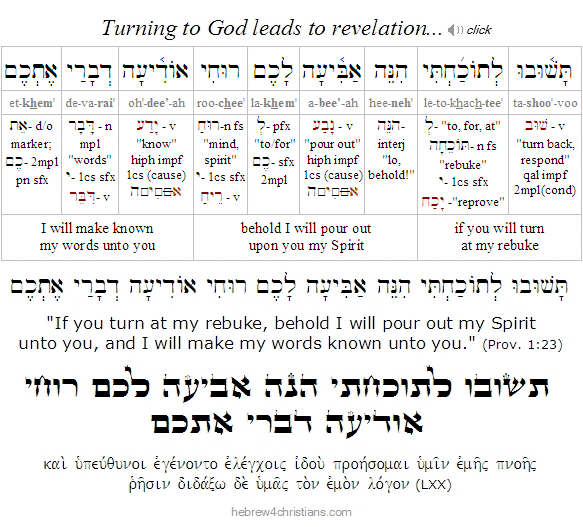 |
Finding Inner Peace...

[ "All God wants of man is a peaceful heart." - Eckhart ]
03.02.22 (I Adar 29, 5782) The ultimate question is whether you feel "safe" with the truth of who you really are... When you are all alone, in a moment of still silence, when the entire world is asleep and suspended, what is the message of your heart's cry? Are you okay? Do you trust who you are or what is happening to you, or do you experience anxiety, a sense of lostness, inner pain?
Comfort is found in God's grace. His promise is given to the sick at heart, to those who understand their need for a physician (Matt. 9:12). Since there is nothing about you to commend before God, you are made free to abandon yourself to the divine love. This is the "Name of the LORD," after all, and your heart's cry for love is a "prayer" uttered in that Name.
Your heavenly Father sees in secret (Matt. 6:6). Consider the birds of the air; they are unreflective, alive in the atmosphere of God's care. What a great blessing to let go of your fear; what sweet relief! Surrender to the truth of your helplessness; rejoice that you are "poor in spirit," and discover that yours is the Kingdom of Heaven (Matt. 5:3).
So don't give up your faith, my friend. The Lord will give strength to his people; the Lord will bless his people with peace. There is hope for your future. God has promised to be with you to the end, leading you to the place where your heart will forever be satisfied in his love.
Hebrew Lesson:
Psalm 29:11 Hebrew Reading:
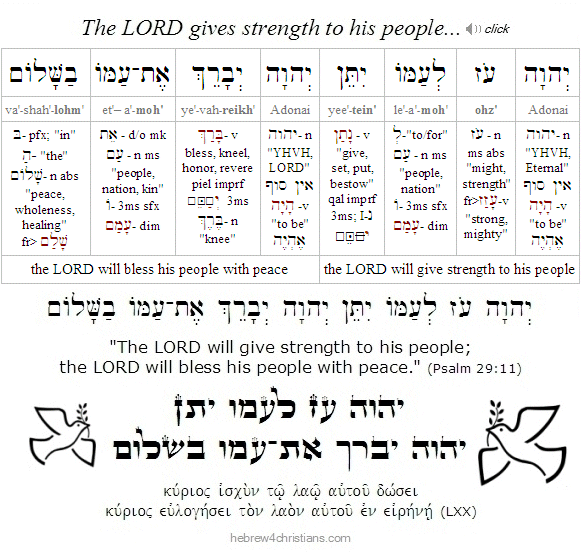 |
The Overcoming Light...

03.02.22 (I Adar 29, 5782) "If I say, surely the darkness shall cover me ... I realize the night shines as the day and that nothing hides from your radiance" (Psalm 139:11-12). We have to trust that God is in our darkness, in the silence, in the unknown... You come out of the shadows when you admit that you act just like other people, that you are human, in need of reconciliation yourself... Above all you need God. You need help. You need a miracle to help you to truly love. You may find excuses for many things, but you cannot escape the "wretched man that I am" reality that is grounded in your fears. God sees in the darkness and is present there, too. When you feel alone, like an unbridgeable gulf lay between you and all that is good; when you feel like you want to scream but are afraid that even then no one would hear, may God shine His light upon you... Amen, may His light shine upon you.
Hebrew Lesson
Psalm 139:11 Hebrew reading:
Cries of the Heart...
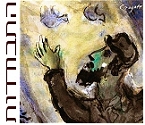
[ "The real hope is not in something we think we can do, but in God, who is making something good out of it in some way we cannot see." - Thomas Merton ]
03.02.22 (I Adar 29, 5782) Whatever else you may think about the commandments of God, the idea of a genuine love connection is foundational and essential. Indeed the very first of the Ten Commandments is Anochi Adonai Elohekha (אָנכִי יְהוָה אֱלהֶ֑יךָ), "I am the Lord your God," which invites you to open your heart to receive the touch of the Spirit of God. There is no love like that of the Lord, but you can't feel that love if you don't speak to Him, and that includes "pouring out your heart" in earnestness, clinging to the truth of his love for you...
We are to pray to God with all our heart, but that must include the broken heart, too - that is, the broken parts of ourselves that must be recollected and mended before the passion of God's healing love. And that must include the angry heart, the crazy heart, the fearful heart, and so on.... We "lift up our soul" to the LORD - all of ourselves - as we let go and pour out our heart before God. Our feelings are important in prayer - the ingredient added to our petitions that quicken the heart and focus the will.... "Return, O Israel, to the LORD your God" (Hos. 14:2) means returning to the place of heartfelt faith - where the LORD is your God, and you live, move, and have your being as his beloved child.
Pouring out your heart to God in an honest, spontaneous, and intensely personal way is called "hitbodedut" (הִתְבּוֹדְּדוּת) in Hebrew. After we "talk our hearts out" (or even "inwardly scream") before the Lord, in our emptiness and in our powerlessness we can begin to truly listen, as it says, "In returning and rest you shall be saved; in quietness and in trust shall be your strength" (Isa. 30:15). Only after we sigh deeply and surrender are we receptive to the voice of the Spirit's whisper. אַשְׁרֵי כָּל־חוֹכֵי לוֹ - "Blessed are all those who wait for Him" (Isa. 30:18). So we wait, we abide, we persevere -- even when God seems to "take his time" or does not immediately intervene in ways we might apprehend. We refuse to lose heart, for we find strength when we trust in God's love... The Light of the world still shines: Yeshua, be my inner word, my heart, and my groaning for life today, and forevermore, amen.
The greatest blessing is to be filled with the desire to draw close to him, to experience "hunger and thirst" (i.e., visceral yearning) for God's presence and touch. Holy desire – expressed in the yearning of heartfelt prayer – is therefore a state of true blessedness, and the more desperate our need for God the more blessed we are. It is our desire, our holy need that creates a bond of connection between our soul and its Creator, and that is the deeper meaning of "mitzvah." As Yeshua said: "Blessed are those who hunger and thirst for righteousness, for they shall be satisfied" (Matt. 5:6).
Hebrew Lesson
Psalm 62:8a Hebrew reading:
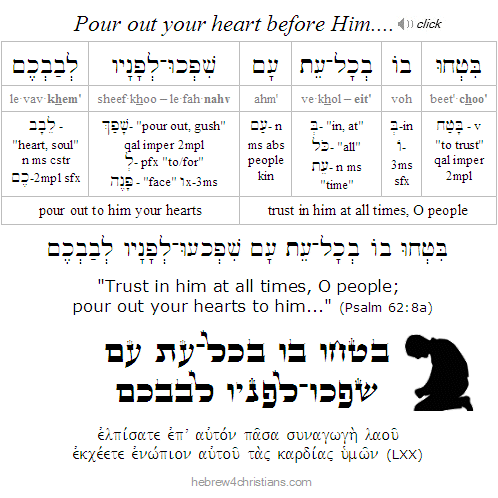 |
Hebrew Blessing for Covid hair loss:
"Blessed are you, O Lord, who counts the hairs on our heads" (amen):
בָּרוּךְ אַתָּה יְהוָה שֶׁהוּא מְסַפֵּר אֶת הַשַּׁעֲרוֹת עַל רֹאשֵׁינוּ
ba·rookh a·tah Adonai she·hoo me·sa-peir et ha·sha·a·roht al rosh·shei'·noo
Shepherd in Darkness....
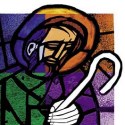
03.01.22 (I Adar 28, 5782) "Yea, though I walk through the valley of the shadow of death, I will fear no evil..." (Psalm 23:4). O God of Light, Light of the world, surely You know my need for light as I look to You, especially when darkness tries to extinguish my hope. Despite my inability to see you now, help me to know that you are with me; let "thy rod and thy staff comfort me" and lead me closer to you. Lord, when I am afraid, quicken the faith you have put within my heart. Be Thou my Shepherd in my darkness, O Lord my God...
In times of testing, how desperately do we need a sense of companionship and intimacy with the Lord! When you feel abandoned, ashamed, or alone; or when you are afraid and unsure of yourself; or when pain distances you from others, nudging you to isolation or loneliness, then may God's Spirit brood over you, whispering your name, reminding you that you are never alone, and that God Himself is forever for you, despite yourself. Therefore "fear no evil," because God is with you in the midst of your present darkness. As it is written: "Surely goodness and love shall pursue you all the days of your life, and you shall dwell in the house of the LORD forever" (Psalm 23:6). Come alive, O heart of faith!
Hebrew Lesson
Psalm 23:6 Hebrew reading:
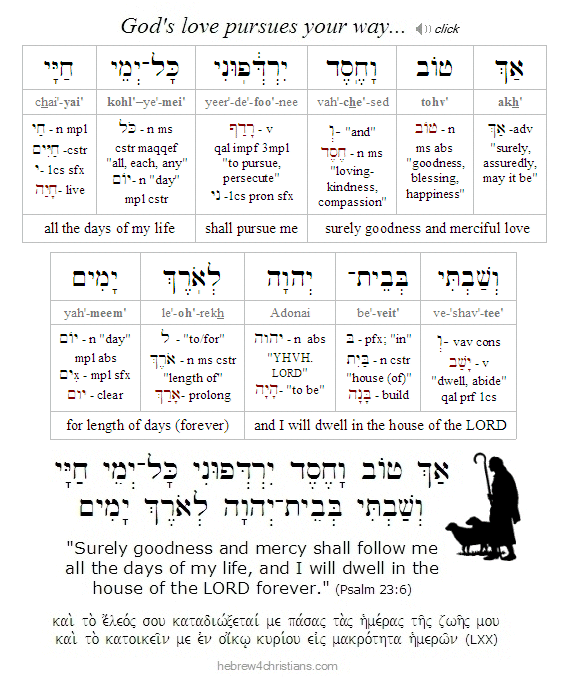 |
Hold Fast to Truth...

[ "Without education, we are in a horrible and deadly danger of taking educated people seriously." - Gilbert Keith Chesterton ]
03.01.22 (I Adar 28, 5782) One of the main strategies of the devil is to induce a sense of forgetfulness, apathy, and hopelessness within your soul... The devil wants you to lose sight of what is ultimately real and who you really are. The truth of God is your weapon against the cascade of lies that pours forth from the world and its various princes (Eph. 6:11-18). The entire venture of teshuvah (repentance) presupposes that you are created "in the image of God," that you are related to him, and therefore your life has infinite value and inherent dignity. This is all the more evident in light of the awesome ransom that Yeshua gave to reconcile your soul with God (2 Cor. 5:21; 1 Pet. 2:24). Therefore hold fast to the truth, friends; da lifnei mi attah omed - "know before Whom you stand!" Turn to what is real, refuse the lies and despair of this fallen world, and review what will abide the test of Eternity....
Hebrew Lesson
Psalm 26:3 Hebrew reading:
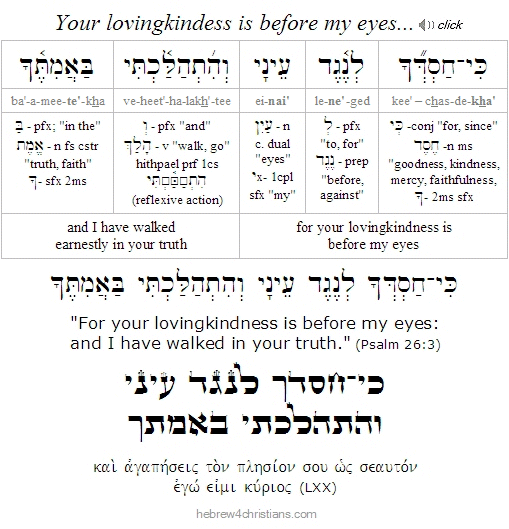 |
Note that the verb translated "I have walked" (הִתְהַלַּכְתִּי) is "hithpael," a verb pattern used to express reflexive, intensive action done to oneself. Therefore we could translate this as "I earnestly choose to walk" in the truth, indicating decisiveness of intent, focus, purpose... As King Shlomo said: בְּכָל־דְּרָכֶיךָ דָעֵהוּ - "choose to know Him in all your ways" (Prov. 3:6).
If you forget the essence of your soul you begin to lose sight of your reason for being, the "why" that underlies all other whys... This essence, however, is not discovered by means of reason, but by revelation -- it is a divine disclosure that awakens you to newness of life. Teshuvah is a return to the arms of your Heavenly Father...
The Inner and the Outer...
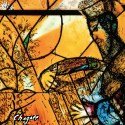
[ Diogenes, a world-denying philosopher from ancient Greece, was once approached by Alexander the Great, who visited him due to his reputation as a sage. When Alexander offered him anything he wanted, Diogenes said, "Just one thing: Get out of my sunlight..." ]
03.01.22 (I Adar 28, 5782) When the prophet Samuel was commanded to anoint Israel's next king from among the sons of Jesse, he was admonished not to be distracted by the outward form and superficialities that mark the way of men and their vanities. After being initially impressed with the looks of Jesse's firstborn son Eliab, the LORD said: "Do not look on his appearance or the height of his stature..." That is, do not regard a man according to the superficial standards of worldly sagacity. Why? Because God delights to choose the least likely of candidates to confound those who are esteemed in their own eyes: "For it is not as a man sees - for man looks "according to the eyes," but the LORD looks "according the heart" (1 Sam. 16:7). Therefore it was David - the youngest son, the overlooked one, the lowly family servant covered with "schmutz" from tending his father's sheep - who was chosen; it was David who had the "beautiful eyes" (יְפֵה עֵינַיִם) of faith that were able to behold the beauty and goodness of the LORD (1 Sam. 16:12). Man looks on the outside, but God searches the heart (1 Chron. 28:9; Prov. 21:2). God turns everything upside down: what is esteemed as big in this world is small in the world to come, and vice-versa (see Luke 16:5).
A principle of spiritual life is that the "inner is not the outer," and vice-versa. People are easily deceived by mere appearances, yet the eye of faith must be trained to look beyond surface phenomena to discern the underlying Reality that upholds the world. This is perhaps most evident in the case of the cross of Yeshua, which the carnal eye regards as a matter of shame and defeat, but the eye of faith regards as the very wisdom, power, and love of Almighty God Himself. "God chose what is foolish in the world to shame the wise; God chose what is weak in the world to shame the strong; God chose what is low and despised in the world, even things that are not, to bring to nothing things that are, so that no human being might boast in the presence of God" (1 Cor. 1:27-29).
Those who rely on appearances will invariably find themselves confounded. The LORD therefore commissioned the prophet: "Go, and say to this people: 'Keep on hearing, but do not understand; keep on seeing, but do not perceive'" (Isa. 6:9). Where it is written, "God gave them over to their stubborn hearts, to follow their own devices" (Psalm 81:12; Rom. 1:24); and "they went backward and not forward" (Jer. 7:24), we learn there is no place of "neutrality" or studied indifference toward God... We are either going forward with Him or going backward; we are either drawing near or pulling our hearts away (Rev. 3:16).
"For God so loved the world" that He became entirely unesteemed -- "despised and rejected of men, a man of pains, acquainted with grief" (Isa. 53:3) – so that he could taste rejection, sorrow, pain, and death for every man (Heb. 2:9). "For our sake God made him to be sin who knew no sin, so that in Him we might become the righteousness of God" (2 Cor. 5:21). It was the love of God that put Yeshua on the Cross, and because of Yeshua, God exchanges our inner hell and abandonment with His everlasting love and acceptance. Bless His Name.
Hebrew Lesson
1 Sam. 16:7c Hebrew reading:
Thoughts on the parashah:
Seeing the Good...

03.01.22 (I Adar 28, 5782) We are instructed to see small miracles, everyday "signs and wonders..." The sages say that a verse from our Torah portion this week suggests that we are obliged to recite at least 100 blessings a day: "... a hundred sockets for a hundred talents of silver, one talent per socket" (Exod. 38:27). The Gerer Rebbe comments, "Just as hundred sockets served as the foundation for the sanctuary, so the daily blessings represent the soul's foundation in holiness."
In Jewish thinking, we "bless" God by offering our thanks, and thereby consciousness of life is sanctified. The Hebrew term for gratitude is hakarat tovah (הַכָּרַת טוֹבָה), a phrase that means "recognizing the good." The heart looks through the eye, and therefore how we see is a spiritual decision: "If your eye is "single" (i.e., ἁπλοῦς, sincere, focused)," Yeshua said, "your whole body will be filled with light" (Matt. 6:22). When we see rightly, we will behold the radiance of God pervading our way, even in the midst of our mundane affairs (Isa. 6:3). A grateful heart is awake to God's Presence in the little things of life, those small miracles and glories that constantly surround us. And just as the manna would taste according to the gratitude of the person eating, so it is with the inner vision of truth: The good eye of faith sees hundreds of reasons to bless God for the precious gift of life. God is "enthroned among the blessings of His people" (Psalm 22:3).
The sages warn that in the case of doubt, however, one should not make a blessing that invokes God's Name, since doing so violates the commandment not to lift up the Name of the LORD for vain reasons. Ironically enough, those who make an "idol" out of the Name of God are lifting up the name in vain! It is preferable not to pray than to do so insincerely or without heart.... On the other hand, surely God invites our requests, and therefore a prayer offered be'emunah shelemah, with complete faith, will be heard in heaven. As it is written in the New Testament: "And this is the confidence (i.e., παρρησία, freedom to speak honestly) that we have with him, that if we ask anything according to his will he heeds us. And if we know that he heeds us in whatever we ask, we know that we presently have the requests that we have asked of him" (1 John 5:14-15).
If you want to see blessing, then you must open your eyes. The "commandment" here is more of a mitzvah, that is, an opportunity to connect with God's heart -- to become alive and awake! The idea is that you "get to" see the miracle, not that "you must" see it. It is always a choice to believe (Col. 3:15).
Hebrew Lesson
Prov. 11:27 Hebrew reading:
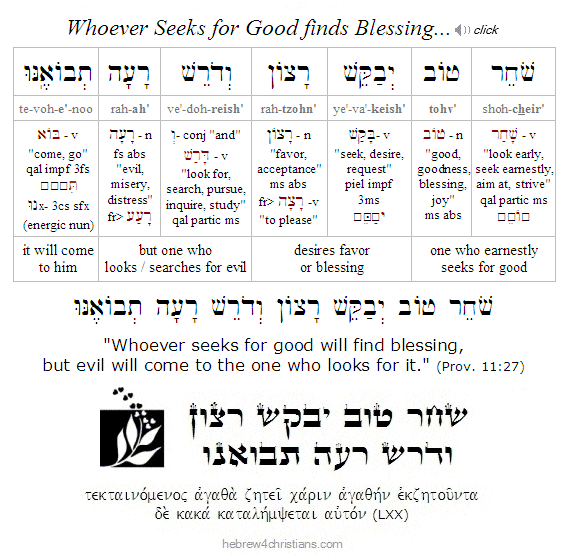 |
<< Return
|





















